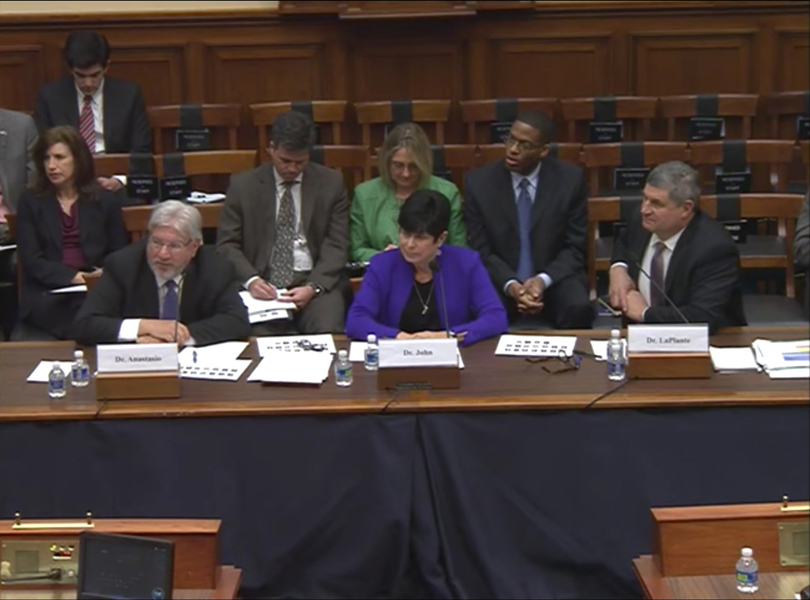"I find hope in the work of long-established groups such as the Arms Control Association...[and] I find hope in younger anti-nuclear activists and the movement around the world to formally ban the bomb."
Board Backs Off Lower-Yield Nukes
April 2017
By Charles J. Carrigan
Members of the Defense Science Board told Congress that the advisory group’s recent report on the potential utility of “lower yield” nuclear weapons was not intended as advocating U.S. production of such weapons.
The civilian technical experts, who testified March 9 before the House Armed Services strategic forces subcommittee, sought to tamp down controversy stirred by the group’s December 2016 report, “Seven Defense Priorities for the New Administration.”
 The part of the 76-page report that drew attention was brief language on the need to increase the flexibility of the U.S. nuclear arsenal, citing lower-yield weapons as a “hedge for future uncertainties.” The path to flexibility includes what the report called lower-yield, “primary only options” that could provide a “tailored nuclear option for limited use, should existing non-nuclear or nuclear options prove insufficient.”
The part of the 76-page report that drew attention was brief language on the need to increase the flexibility of the U.S. nuclear arsenal, citing lower-yield weapons as a “hedge for future uncertainties.” The path to flexibility includes what the report called lower-yield, “primary only options” that could provide a “tailored nuclear option for limited use, should existing non-nuclear or nuclear options prove insufficient.”
It is a sensitive issue because critics warn that such tactical weapons lower the threshold for nuclear conflict and suggest there is a viable option for limited nuclear war.
Board member Michael Anastasio, a former director of the Los Alamos National Laboratory, said the panel intended only to suggest that the U.S. nuclear enterprise have the flexibility and capability to produce such weapons if a policy decision were made that they are needed. The board had tried to “distinguish between the technical capability of this enterprise versus the policy questions,” he testified.
In the wake of the report, Sen. Dianne Feinstein (D-Calif.) and 12 other Senate Democrats wrote March 14 to Defense Secretary James Mattis and Energy Secretary Rick Perry expressing opposition to building a new, lower-yield nuclear weapon. “We strongly believe there is no such thing as the limited use of nuclear weapons or limited nuclear war,” they wrote.
“For 71 years, the United States has led the world in opposition to the use of nuclear weapons, leadership that would be called into question should the United States develop new, so-called low-yield nuclear weapons,” they wrote.
The issue is complicated by Russia’s evolving “escalate to de-escalate” doctrine, which envisions its limited use of tactical nuclear weapons during a conflict in a show of determination intended to force the United States to back down to avoid full-scale nuclear war. The report includes a reference to the doctrine in a section that examined the reasons for continued U.S. development of deterrent capabilities.
At the hearing, board member Miriam John, retired vice president of Sandia National Laboratories facility in Livermore, Calif. emphasized the need to ensure that the technical flexibility will exist to produce such weapons. “If there’s a military need, then the [enterprise] will respond, but there is no military requirement,” she said. When asked to clarify that there is not a need for such tactical nuclear weapons, she responded by just saying, “Today.”
Another controversial part of the report suggested that the United States may need to resume underground nuclear testing at some point to advance “scientific understanding” and ensure the reliability of the nuclear stockpile. “It is my view, and I think the view of the Defense Science Board, that we do not need nuclear testing right now,” Anastasio clarified in his testimony.
The United States ended nuclear testing in September 1992 and has relied on the Stockpile Stewardship Program to maintain and modernize nuclear weapons without the need for explosive testing. Although noting the capabilities of that program, the report says that “an open question remains as to how long one can have confidence in the weapons” through this approach.
The senators, in their letter, offered strong opposition to consideration of renewed testing. “We do not believe it is an ‘open question,’ as the board claims, whether the science-based Stockpile Stewardship Program and associated nuclear warhead life extension programs can maintain our confidence in the long-term reliability of our nuclear deterrent,” they wrote.
“Additionally, in 2015, the three nuclear weapons lab directors reported that the country was in a better position to maintain the nuclear arsenal than it was during the era of test explosions, which ended more than 20 years ago,” they wrote. “We strongly believe that the United States does not need to resume nuclear testing, which will only encourage others to do the same. Instead, we should seek to reinforce the global norm against nuclear weapons testing.”
